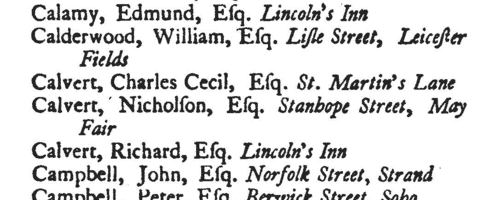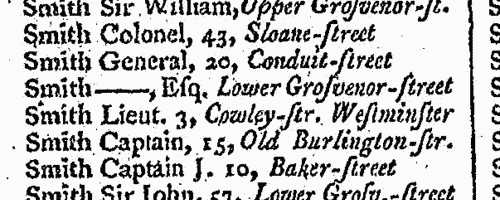Add this eBook to your basket to receive access to all 77 records. Our indexes include entries for the spelling caddell. In the period you have requested, we have the following 77 records (displaying 11 to 20): These sample scans are from the original record. You will get scans of the full pages or articles where the surname you searched for has been found. Your web browser may prevent the sample windows from opening; in this case please change your browser settings to allow pop-up windows from this site.  Masters of Apprentices registered at Bristol in Gloucestershire
(1710-1712) Masters of Apprentices registered at Bristol in Gloucestershire
(1710-1712)
Apprenticeship indentures and clerks' articles were subject to a 6d or 12d per pound stamp duty: the registers of the payments usually give the master's trade, address, and occupation, and the apprentice's father's name and address, as well as details of the date and length of the apprenticeship. There are central registers for collections of the stamp duty in London, as well as returns from collectors in the provinces. These collectors generally received duty just from their own county, but sometimes from further afield. May 1710 to January 1712. For some reason, the Bristol collector was the only one in the country to make his return in Latin. (The sample entry shown on this scan is taken from a Shropshire return) | Sample scan, click to enlarge

|  Apprentices registered at Edinburgh
(1719-1721) Apprentices registered at Edinburgh
(1719-1721)
Apprenticeship indentures and clerks' articles were subject to a 6d or 12d per pound stamp duty: the registers of the payments usually give the master's trade, address, and occupation, and the apprentice's father's name and address, as well as details of the date and length of the apprenticeship. There are central registers for collections of the stamp duty in London, as well as returns from collectors in the provinces. There was a single collection for the whole of Scotland, made in Edinburgh. The sums collected are recorded in Scottish money, with conversion to sterling for transfer to London. A Scottish pund was worth 20 English pence. Because of the delay before some collectors made their returns, this register includes indentures and articles from as early as 1718. (The sample entry shown on this scan is taken from a Norfolk return) | Sample scan, click to enlarge

|  Apprentices registered in Scotland
(1750-1754) Apprentices registered in Scotland
(1750-1754)
Apprenticeship indentures and clerks' articles were subject to a 6d or 12d per pound stamp duty: the registers of the payments usually give the master's trade, address, and occupation, and the apprentice's father's name and address, as well as details of the date and length of the apprenticeship. There are central registers for collections of the stamp duty in London, as well as returns from collectors in the provinces and from Scotland. (The sample entry shown on this scan is taken from a Norfolk return) | Sample scan, click to enlarge

|  Apprentices
(1754) Apprentices
(1754)
Apprenticeship indentures and clerks' articles were subject to a 6d or 12d per pound stamp duty: the registers of the payments usually give the master's trade, address, and occupation, and the apprentice's name, as well as details of the date and length of the apprenticeship. 2 August to 31 December 1754. | Sample scan, click to enlarge

|  Apprentices and trainee clerks
(1762) Apprentices and trainee clerks
(1762)
Apprenticeship indentures and clerks' articles were subject to a 6d or 12d per pound stamp duty (late payment of the 6d rate attracted double duty (D D) of 12d): the registers of the payments usually give the master's trade, address, and occupation, and the apprentice's name, as well as details of the date and length of the apprenticeship. 1 January to 31 December 1762. | Sample scan, click to enlarge

|  Apprentices and articled clerks
(1765) Apprentices and articled clerks
(1765)
Apprenticeship indentures and clerks' articles were subject to a 6d or 12d per pound stamp duty (late payment of the 6d rate attracted double duty (D D) of 12d): the registers of the payments usually give the master's trade, address, and occupation, and the apprentice's name, as well as details of the date and length of the apprenticeship. 2 January to 31 December 1765. | Sample scan, click to enlarge

| Members of the Society for the Encouragement of Arts &c.
(1766)
A List of the Society for the Encouragement of Arts, Manufactures, and Commerce, 18 August 1766. | Sample scan, click to enlarge

|  Masters of Apprentices
(1767) Masters of Apprentices
(1767)
Apprenticeship indentures and clerks' articles were subject to a 6d or 12d per pound stamp duty (late payment of the 6d rate attracted double duty (D D) of 12d): the registers of the payments usually give the master's trade, address, and occupation, and the apprentice's name, as well as details of the date and length of the apprenticeship. 1 January to 31 December 1767. | Sample scan, click to enlarge

| Lawyers, Law Officers and Clerks in London
(1791)
The London Law Directory section of the Universal British Directory includes lists of officers, officials and clerks from the High Court of Chancery, Hanaper Office, Examiners Office, Commissioners of Bankrupts, Corporation of Cursitors Office, Commissioners of Lunatics, the courts of King's Bench, Common Pleas, and Exchequer, the Exchequer Office of Pleas, &c. &c., the Duchy of Lancaster Office, the Lord Mayor's Court Office, and the Court of Marshalsea, as well as public notaries, officers of the judges' circuits, proprietors of provincial newspapers, sworn brokers of the City of London, and Jew brokers. | Sample scan, click to enlarge

| London nobility and gentry
(1791)
The Universal British Directory includes a list of the nobility, gentry, &c. in London and Westminster: esquires, i. e., gentlemen without titles, are sometimes listed without their christian names. | Sample scan, click to enlarge

|
Research your ancestry, family history, genealogy and one-name study by direct access to original records and archives indexed by surname.
|












